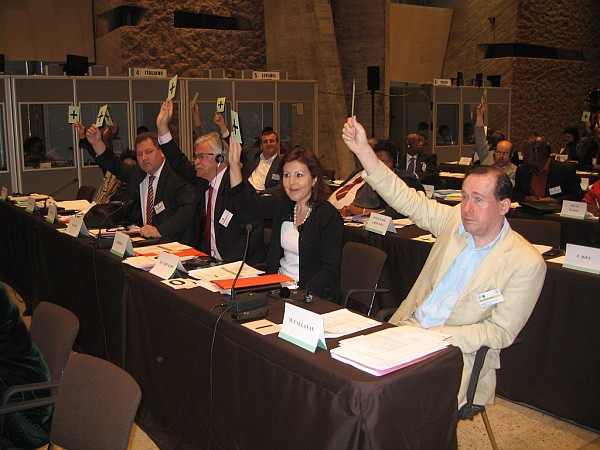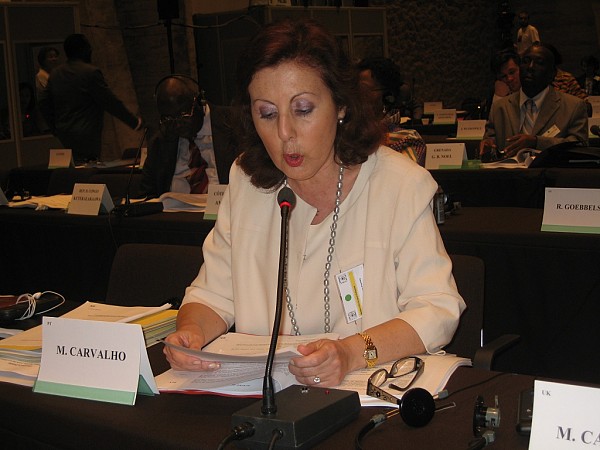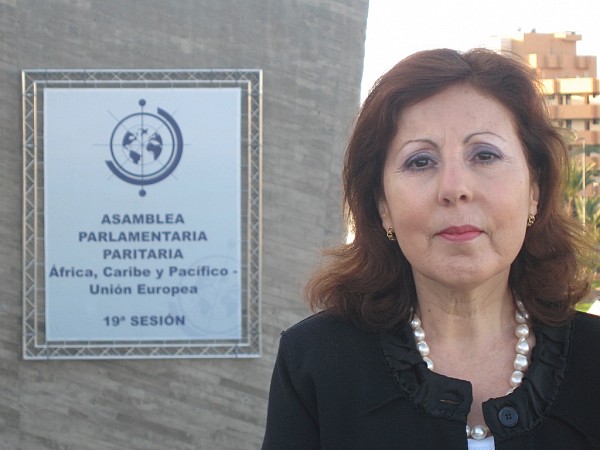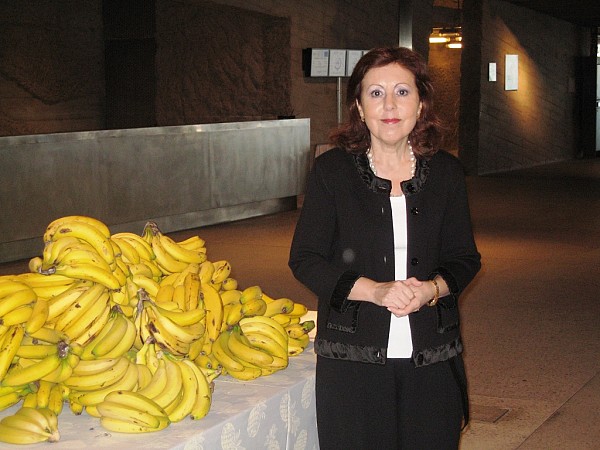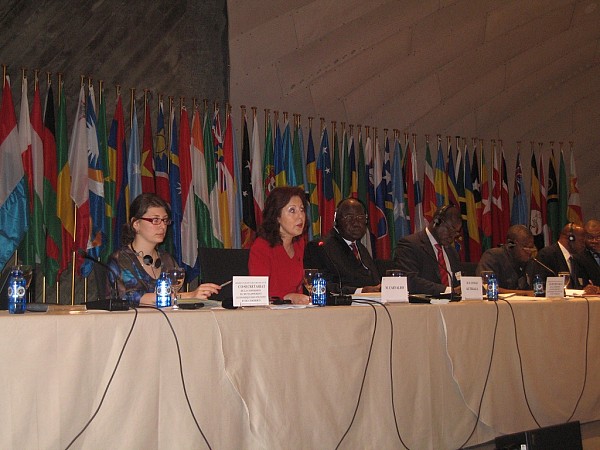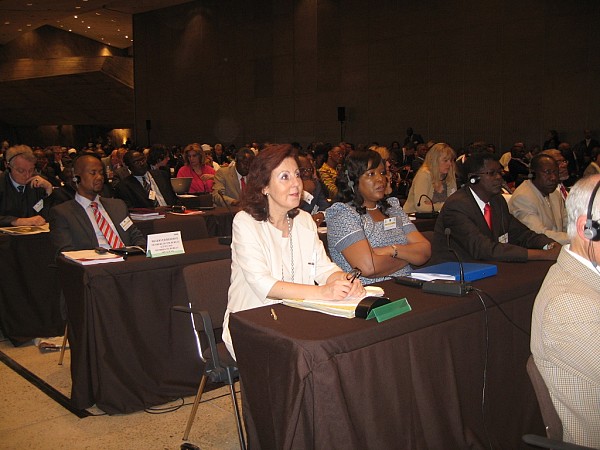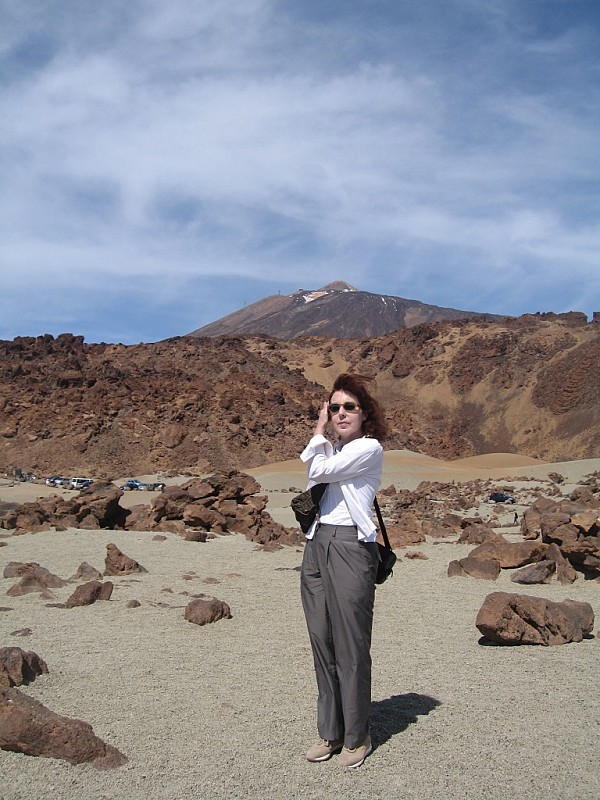Work in Parliament ACP-EU Joint Parliamentary Assembly - 19th Session
A deputada do PPE, Maria da Graça Carvalho participou na 19° Sessão da Assembleia Parlamentar Paritária ACP-UE que decorreu em Tenerife entre 27 de Março e 1 de Abril e que contou com a participação de vários países de África, Caraíbas e Pacífico. Durante os dias em que decorreu a reunião, tiveram lugar debates sobre os temas: Estratégia Regional, impacto financeiro e económico das alterações climáticas nos estados ACP, para além do habitual tempo de perguntas e respostas à Comissão Europeia e ao Conselho.
SABADO 27 Março
Reunião Comissão dos Assuntos Sociais e do Ambiente:
Nesta reunião, foi aprovado o relatório "Impacto Social de Crise Global", que analisa as implicações de crise global no plano do desenvolvimento social nos países ACP e aponta políticas de resposta à crise global. Segundo o relatório, o investimento social é produtivo. As despesas para o desenvolvimento do capital humano, considerado factor essencial, e para a protecção dos grupos mais vulneráveis devem ser reforçadas e não afectadas, pois constituem a chave do progresso. O relatório refere também que urge ter em conta o apelo do Presidente do Banco Mundial à criação de fundos de vulnerabilidade, alimentados pelos países desenvolvidos. A acção dos fundos de vulnerabilidade deverá ser direccionada para projectos de distribuição de sementes e fertilizantes, projectos de nutrição materno-infantil e programas de distribuição de refeições na escola. O investimento nas áreas de saúde, educação e nutrição constitui um investimento no capital humano.
Na segunda parte da reunião foi apresentado o relatório "Objectivos do Milénio: Soluções Inovadoras para Superar os Desafios Sociais e Económicos, da Federação Internacional das Sociedades da Cruz Vermelha e do Crescente Vermelho (FICV), apresentado pelo Vice Secretário-geral da Diplomacia Humanitária, Mathew Varghese.
Também em relação aos objectivos para o milénio, a Organização Mundial da Saúde, apresentou o relatório "Fortalecimento do sistema de saúde para uma cobertura universal de saúde e de protecção social" que visa a necessidade do incremento dos trabalhadores na área da saúde. A apresentação foi realizada pela Assistente do Director Geral da OMS, Susanne Weber-Mosdorf.
Durante o debate que se seguiu, Maria da Graça Carvalho mostrou a sua concordância neste tema e sublinhou durante a sua intervenção "a importância do sector da saúde para o desenvolvimento" e declarou que "o mundo não tem suficientes profissionais da saúde, e muitos dos profissionais da saúde formados nos países ACP, emigram para os países desenvolvidos pela falta de condições e de oportunidades. Com o crescente envelhecimento da população, precisamos de mais e melhores profissionais nesta área." Também chamou a atenção para o facto de que uma licenciatura em medicina representa um investimento em média de 20.000€ por ano por estudante enquanto que uma licenciatura em direito representa um investimento de 500€ por ano por estudante. "Com as restrições nas finanças públicas, os governos tenderão a não incrementar o número de estudantes nas universidades de medicina. Temos que chamar a atenção dos Governos europeus para incrementarem o número de estudantes no sector da saúde".
Reunião Comissão do Desenvolvimento Económico, das Finanças e do Comércio.
Como Co-Presidente da Comissão do desenvolvimento Económico, das Finanças e do Comércio, Maria da Graça Carvalho presidiu esta Reunião, na qual foi aprovado o relatório "Impactos Económicos e Financeiros das Alterações Climáticas nos Países ACP". Foram ainda apresentados e aprovados os Relatórios Estratégicos Regionais relativos à Comunidade Sul-Africana para o desenvolvimento, África Ocidental, África Oriental e Oceano Índico, região do Pacífico, região do Caribe e África Central.
Reunião de Constituição do Grupo de trabalho ACP-RUP: "O Espaço de Cooperação Atlântico Euro-Africano". A incorporação das regiões ultra-periféricas no processo de integração regional na África Ocidental.
A reunião começou com o discurso de boas-vindas do Vice-presidente e Ministro Regional da Economia e das Finanças do Governo das Canárias, José Manuel Soria López, que falou sobre o tema "O Espaço de Cooperação Atlântico Euro-Africano e a incorporação das regiões ultra-periféricas no processo de integração regional na África Ocidental".
Após o discurso de abertura foi apresentado e criado o grupo de trabalho ACP-RUP (Regiões Ultraperiféricas da União Europeia: as Ilhas Canárias, os Açores, a Madeira e os Departamentos franceses do Ultramar). O Objectivo da constituição do Grupo de trabalho ACP-RUP é sensibilizar a Comissão Europeia para a criação de um espaço de cooperação "Espaço Atlântico Euro-Africano", entre as regiões ultra-periféricas das Canárias, dos Açores e da Madeira com os países ACP. Este grupo de trabalho visa também dinamizar o diálogo e a cooperação entre as RUP e os países ACP vizinhos a partir da Assembleia Parlamentar Paritária.
Durante a sua intervenção na reunião, Maria da Graça Carvalho manifestou o seu apoio à constituição do grupo de trabalho ACP-RUP declarando que "desde o alargamento, a Europa tem esquecido a frente Atlântica virando as suas preocupações mais para o Mediterrâneo e para o sul. A criação do Espaço Atlântico Euro-Africano permitiria aprofundar as relações entre a costa sudoeste europeia, as RUP e os países vizinhos ACP, melhorando assim a cooperação em matérias tais como os transportes, a segurança energética, o intercâmbio científico, o desenvolvimento do turismo, a segurança e o combate à imigração ilegal. A deputada declarou também que "A UE tem diversos instrumentos que se poderiam adaptar aos objectivos traçados aqui, desde logo o espaço Euro-mediterrânico e as estratégias regionais, como por exemplo a estratégia do Mar Báltico. Temos ainda a política de Vizinhança."
No fim da reunião foi aprovada a Proposta de Declaração Conjunta do Espaço Atlântico Euro-Africano pelo Co-Presidente europeu da União Europeia da Assembleia Parlamentar Paritária, a Co-Presidente da Comissão do Desenvolvimento Económico, das Finanças e do Comércio da Assembleia Parlamentar Paritária ACP-UE (Maria da Graça Carvalho), os deputados da Assembleia Parlamentar Paritária ACP-UE de Angola, Benim, Cabo Verde, Camarões, Gabão, Gâmbia, Chana, Guiné Equatorial, Mauritânia, Senegal, Togo, os eurodeputados das regiões ultra-periféricas (RUP) dos Açores, e Madeira, representados pelo eurodeputado das Ilhas Canárias, os eurodeputados da Reunião e da Nova Caledónia, bem como o Representante da União Europeia da União Africana junto das ACP e o apoio do Secretário-Geral do Grupo de Estados ACP e o Representante Permanente da CEDEAO junto da UE, com vista a constituírem um Grupo de trabalho ACP-RUP, formado por deputados ACP africanos/atlânticos e euro-parlamentares das Regiões Ultra-periféricas com vista a contribuir para dinamizar as relações de parceria entre ACP-RUP.
SEGUNDA-FEIRA 29 Março
Abertura oficial da 19° Sessão da Assembleia Parlamentar Paritária ACP-UE.
O Presidente do Governo Regional das Ilhas Canárias, H.E Paulino Ribeiro, realçou no seu discurso o papel decisivo para esta região de questões como as alterações climáticas, Energias Renováveis, Migrações e o papel fundamental do sector de produção de Bananas para a economia, e para o desenvolvimento social e protecção da paisagem. Apontou também o papel preponderante das RUP na ligação da U.E. com as regiões vizinhas constituindo plataformas para o desenvolvimento de Turismo, Transportes, TIC´s, intercâmbio científico e energia.
O Co-Presidente da Assembleia Parlamentar ACP-UE, Charles Milupi, destacou no seu discurso as consequências das alterações climáticas e expressou o desejo de que as Nações Unidas cheguem a um acordo "binding" até ao fim do ano, pois para os países pobres, as alterações do clima, o ambiente e o desenvolvimento são assuntos interligados. Também declarou que "atingir os objectivos do Millennium é possível. A China conseguiu tirar milhões de pessoas do limiar da pobreza". A crescente crise económica, a despesa em defesa e os subsídios em Agricultura, mostram que financiamento não é problema. O Problema é a vontade política. Por último, Charles Milupi pediu mais atenção à área da saúde dentro dos objectivos do Millenium bem como um maior apoio por parte da UE para este sector.
O Co-Presidente da Assembleia Parlamentar ACP-UE, Louis Michel, realçou o problema da imigração de África para a Europa e lamentou as vidas perdidas de jovens que tentam alcançar a Europa, vindos da Mauritânia e do Senegal. Defendeu o modelo de imigração "intermitente", uma imigração legal em que os imigrantes poderiam viajar entre o país de origem e país de acolhimento sem problemas. Também expressou a esperança nas próximas eleições do Sudão. Realçou a relevância da reunião de 31 de Março dos doadores do Haití. A comissão deveria criar um "European Union First Aid Team" que poderia ser accionado em 24horas em caso de necessidade. O acordo sobre as bananas que se atingiu, demorou 20 anos a negociar. Esta Assembleia representa 1,5 mil milhões de pessoas. O método de trabalho desta assembleia deverá ser mais visível, mais operacional, e nela serão discutidos os assuntos da actualidade. A terminar pediu ao Conselho Europeu para dar uma atenção especial a Madagáscar.
No seu discurso, o Ministro dos Negócios Estrangeiros de Espanha, Moratinos, referiu que no dia 19 de Março foi acordada a revisão do acordo de Cotonu, tendo em conta a nova realidade do Tratado de Lisboa e da União Africana. Este acordo vai ser formalmente assinado no verão em Anagaduzu. Apontou a boa governação, a liberdade e a defesa da democracia e a luta contra qualquer forma de discriminação como fundamentais para os Países ACP. Referiu que a Presidência Espanhola inclui no Conselho Europeu de Junho o tópico da cooperação. É a primeira vez que este tópico será debatido a nível do Conselho Europeu.
Primeira Pergunta de Maria da Graça Carvalho à Comissão Europeia:
"A maioria das regiões ultraperiféricas europeias e as suas regiões vizinhas ACP enfrentam desafios comuns. Uma parceria estratégia para a região Atlântica dos países ACP-UE iria melhorar os sistemas de comunicação, preservar o meio ambiente, fomentar o crescimento, o intercâmbio científico, a criação de emprego, a segurança e a luta contra a imigração ilegal. Constituiria, ainda um desenvolvimento da Europa na sua vertente Atlântica e estabeleceria mais uma ponte entre a Europa e a África.
Quais os instrumentos que a Comissão tem à sua disposição para criar uma parceria estratégia entre a Europa, regiões ultraperiféricas e países vizinhos ACP na sua vertente Atlântica?"
Reply given by the Commission to the oral question:
The Commission believes there is a need for an increased cooperation between the ACPs and the EUs Outermost Regions. This position is reflected in recent Communications (2007 & 2008) on the EU Strategy for the outermost regions (ORs) and in the various axes of the programmes co-funded by the European Regional Development Fund (Territorial Cooperation Programmes).
Thus, the Commission encourages initiatives aiming at increasing cooperation between outermost regions and ACP countries. the support to these initiatives is provided in the framework of the Cohesion Policy and of its policy with ACP countries, facilitating the regulatory and financial instruments (ERDF2, EDF3) which allow for its implementation.
In that respect, one programme for Territorial Cooperation supported by the ERDF is currently implemented in the Atlantic region. This is the operational programme "Madeira-Açores-Canarias" (MAC) with a total envelope of E55 million out of which E24 million are reserved for cooperation with Cabo Verde, Senegal and Mauritania.
Funds have also been set aside in the context of the programming of the 10th EDF, in some national or regional indicative programmes for cooperation with the Outermost regions.
To give some examples of coordination between the ERDF and EDF:
- The "Special Partnership between the EU and Cape Verde", integrated into the 10th EDF national indicative programme for Cape Verde, includes an amount of E11,5 million for cooperation with the Canary Islands, Açores and Madeira.
- Mauritania's 10th EDF national indicative programme refers to the coordination of actions with the Canary Islands, Acores and Madeira in the field of decentralisation, governance, transport and culture. It indicates that such actions are to be supported by at least E2 million financed from the programme covered by the 10th EDF national indicative programme, as a counterpart to ERDF funding.
- Senegal's 10th EDF national indicative programme also makes it possible to ensure the parallel co-financing of projects or specific activities that are jointly identified with the Canary Islands, Açores and Madeira. The funds for such co-financing are to be drawn from Senegal's global allocation (of E23 million).
Segunda Pergunta de Maria da Graça Carvalho à Comissão Europeia:
"I would like to thank the commissioner for the detailed answer. In the answer, the Commission has stated that the Commission encourages initiatives aiming at increasing cooperation between outermost regions and ACP countries. The financial support to these initiatives is provided by the European Regional Development Fund. However these funds have different rules and complexities. In practical terms, it is very difficult to make these two funds complementary.
Is the Commission willing to look at this question during the revision of the financial regulation in the framework of the financial perspectives that is under discussion?
"I would like to regret that the Portuguese is not a working language in this assembly. We have members of the Parliament of Angola, Cabo Verde, Angola and Mozambique".
Debate with the Commission - catch-the-eye
Statement by Mr Andris Piebalgs, European Commissioner for Development
Pergunta de Maria da Graça Carvalho ao Comissário Pielbegs:
"Two days ago, on 27 March, the Joint Parliamentary Assembly Committee on Economic Development, Finance and trade adopted conclusions on the Regional Strategy Papers. These conclusions will be discussed under the following agenda (point 8), adopted by the Plenary on Thursday, 1 April, and then transmitted to the Commission. The Commission will therefore receive the JPA conclusions prior to the mid-term review of the Regional Strategy Papers, scheduled to conclude in April or May this year.
As the Co-Chair of the Economic Committee, I would like to ask whether and how you will make sure that the Commission takes the Assembly's conclusions into account in the mid-term, review of the Regional Strategy Papers.
Regional Strategy Papers - Introductions to the debate
Introdução de Maria da Graça Carvalho como Presidente da Comissão de Desenvolvimento Económico, Finanças e Comércio à apresentação dos relatórios Estratégicos Regionais:
"For the 10th European Development Fund, for the first time, there is the legal provision for draft Country and Regional Strategy Papers to be officially transmitted to the ACP-EU Joint Parliamentary Assembly for information.
This is a very significant development as it allows the Joint Parliamentary Assembly, and through its Members the ACP national parliaments, to access to the information needed to carry out an examination of the EDF strategies.
The new provisions lead very clearly towards genuine parliamentary participation. The RSP Conclusions are to convey a general message to the Commission and give a broad outline of the matters to be considered by the Commission in the mid-term review of the EDF strategies. And I acknowledge Commissioner Pielbags for his promise to take the conclusions into consideration.
Each RSP conclusion outlines:
Firstly, the context in the region and regional challenges, especially those related to achieving the MDGs, as well as the level of regional integration and the specific challenges for the regional integration process.
Secondly, the response proposed in the Regional Strategy Paper and the Regional Indicative Programmes - i.e. focal and non-focal sectors that have been selected and the amount of funding earmarked for each sector.
Thirdly, we have also looked into the timeliness and adequacy of the RSP financial support and the actions and level of funding for the implementation of the Economic Partnership Agreements.
Finally, the RSP conclusions include in a very clear manner, some recommendations to the Commission to be taken into account at the Mid-Term Review of the Regional Strategy Papers
The Committee on Economic Development, Finance and Trade have therefore dedicated time and work in the past year on these RSP conclusions, which were finally adopted in Committee only two days ago.
To conclude, I would like to note that this time we have exercised scrutiny powers in an informal manner. I however trust that the Commission will take them into account as much as possible in the mid-term review of the EDF strategies.
I also hope that the JPA will formalise its scrutiny role by means of a provision being included in the Cotonou Agreement at its current revision process."
TUESDAY 30 March
The financial and economic impact of climate change in ACP countries
Report by Mr Buti Manamela (South Africa) and Mr Frank Engel
Committee on Economic Development, Finance and Trade
Debate sobre o Relatório "Impacto Financeiro e económico das alterações climáticas nos países ACP"
Intervenção de Maria da Graça Carvalho:
"I welcome the report and thank the two co-rapporteurs.
ACP countries have least contributed to climate change but are facing the most severe consequences. Climate change constitutes a serious threat to poverty reduction, availability of water and energy, food security and health. Climate change will contribute in a severe manner to increase the vulnerability and fragility of the least developed countries and the small islands developing states. For the COP-15, in Copenhagen, the EU was technically well prepared; we had an energy and climate package, a well defined negotiation position. However, we did not prepare the necessary political alliances and we need political allies, such as the ACP countries, to achieve a comprehensive a legally binding international agreement. I welcome the statement of Commissioner Pielbags yesterday that the political dialogue on climate change with the ACP countries is a priority for the Commission and that political dialogues will be organised through regional workshops. During the negotiations of the Kyoto Protocol, the Portuguese presidency has organised three regional workshops (Africa, Caraibas and Latin-America) that were fundamental for the smooth and speedy agreement between Industrialised countries and developing countries. We should strengthen the cooperation with the ACP countries in the areas of climate change, where capacity building and scientific cooperation plays a fundamental role.
The investment required for combating climate change in developing countries can not come from public funds alone. The private sector must also contribute and there is the need of innovative financing mechanisms. Furthermore, we need a new model for sustainable global governance with greater participation of the ACP countries.
Windhoeck Dialogue Lunch:
The Windhoek Dialogue is the EPP-ED Group's African policy initiative, launched in March 1996, in Windhoek, the Capital of Namibia, with five African parties coming from anglophone countries in Southern and East Africa.
The idea behind the Windhoek Dialogue was to develop a network for co-operation, not only between the EPP-ED Group and its African partners, but also among the African political parties themselves. Thus to create a forum where like-minded African parties and Members of the EPP-ED Group in the European Parliament could meet and exchange ideas and experiences on democratic development and co-operation.
QUARTA FEIRA 31 Março
Statement by Mr Paul Bunduku-Latha, Minister Delegate to the Minister of Economy,
Commerce, Industry and Tourism (Gabon), President-in-Office of the ACP Council
Statement by Mr Angel Lossada, Deputy Minister for Foreign Affairs, (Spain),
President-in-Office of the EU Council
Question Time to the Council
Pergunta realizada por Maria da Graça Carvalho:
"Given the importance of integrating the outlying regions with their geographical surroundings and the sensitivity and potential from both sides, in that context of regional integration, attaching to interregional air and sea transport links from the viewpoint of both these regions and the local, regional, and national authorities of the neighbouring ACP countries, is the Council in a position to mandate the Commission to submit a financial proposal for an integrated transport policy for the most remote regions, taking account of the threefold nature of the challenges facing them, concerning respectively: inter-island links within the outlying island regions; links with the European mainland; and links with neighbouring third countries?"
Debate with the Council - catch-the-eye
Debate com o Conselho
Pergunta realizada por Maria da Graça Carvalho ao Secretário de Estado do Desenvolvimento de Espanha:
"Many of ACP countries have specific vulnerabilities and fragilities such as the small island states. The application of the revised Cotonu Agreement should have into consideration the International Strategy of Mauricias and the Action Plan of Barbados which point out a list of measures to help small island states to achieve its sustainable development. I would like to take this opportunity to ask the European Council how the application of the revised Cotonu Agreement and the European Development Fund will take these vulnerabilities into consideration?.
Economic Partnership Agreements - state of play
Debate without resolution
Debate "Economic Partnerships Agreements - state of Play"
Intervenção de Maria da Graça Carvalho:
"The negotiations of the EPAs are aimed at redefining the trade regime between the EU and ACP countries and this intending to consolidate regional integration initiatives within the ACP and to faster gradual integration of the ACPs into the global economy on the basis of an open, transparent and predictable framework for goods ads services.
But the negotiations of EPAs have been taking place in an international context characterised by increased liberalisation. And EPAs should be trade and cooperation agreements at the service of developments. But EPAs are above all instruments for development. The EPAs should be designed to take into consideration the economic, social and environmental constrains of the ACP countries. Special attention should be paid to the fragility of the business environment of some ACP countries. The EPAs have raised serious concerns about their capacity to actually deliver development. The impact of the EPAs on poverty and poverty eradication, on the ACP regional integration processes have been called into question. To ensure that the development dimension of EPAs is fulfilled and to make sure that EPAs do not actually contribute to further economic marginalisation of ACP states, it is of prime importance to closely monitor the implementation of the new partnership agreements. EPAs are a priority and should make sure that their application achieve the expected results. The E.P. and this assembly should have a more prominent role in this process. I purpose that the Economic Development, Finance and Trade Committee will discuss how this committee may play an enhanced role in this process."
Outermost regions and their role in regional development
Debate without resolution
Debate "As regiões ultraperiféricas e o seu papel no desenvolvimento regional"
Intervenção de Maria da Graça Carvalho:
"The southwest European Region (Atlantic coast and the three outermost regions, Madeira, Azores and Canarias) face common challenges with the neighbouring regions of west coast of Africa.
An integrated strategy for this region would improve the transport and communication system, the energy security and the fight against illegal immigration. The UE has several instruments that would fulfil these objectives such as the Regional Strategies (like the recently created Baltic sea strategy and the on-going Danube strategy), the neighbourhood policy, and the example of the Euro Mediterranean Area.
In the meeting of the 27 March, here in Canarias, a working group was created composed by MEPs from the outermost regions and members of the parliament of the neighbour ACP regions. As co-president of the economic development, finance and trade committee, i was also invited to participate. This working group will have as one of its first objectives to promote the establishment of an Euro-African Atlantic cooperation area.
One of the priorities of this group should be to analyse together with the commission and the council which are the most adequate political instruments and the matching fundings. It will be of outmost importance that the existing and future funds applicable to the European outermost regions and ACP regions are compatible, simple and flexible in their application in order to allow integrated projects.
I welcome the announcement made by the commission that a task force was creates inside the Commission exactly with this objective."
Urgent topic No. 2: Supporting the consolidation of peace in Southern Sudan
Intervenção de Maria da Graça Carvalho:
"I welcome the resolution on supporting the consolidation of peace in southern Sudan. I would like to stress that European Union, the African Union and the international Community should urgently agree on measures to support democratic governance through Sudan.
Key reforms are needed to ensure that national elections and the southern referendum are credible, free and fair. We should make sure that protection of the civilians is a priority and put an end to impunity, bring criminal suspects to justice in order to build trust is of outmost importance.
To conclude, I would like to stress the role of women in creating a stronger civil society and promoting stability in Sudan and in the system of allocation and execution of funds. The international institutions should give a more prominent role to women in Sudan."
QUINTA FEIRA 1 Abril
Voting and closing of the session
- Vote on the motions for resolution included in the reports submitted by the standing
- Committees
- Vote on the urgent motions for resolution
- Vote on the draft conclusions on the Regional Strategy Papers
- Vote on the declaration on bananas
Anexos:
Na imagem, Maria da Graça Carvalho entre o Vicepresidente do Governo das Canarias, José Manuel Soria e o deputado ao Parlamento Europeu Gabriel Mato, com o grupo de trabalho da ACP-RUP.
